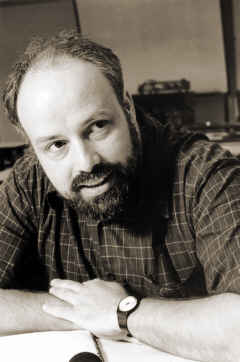Julian
Dunn
1961-2003

|
Julian Dunn died of leukemia on 23rd January 2003, aged 41. With his death the audio engineering profession has lost a brilliant equipment designer, a dedicated standards developer and a selfless teacher. Julian earned the respect and affection of a great many people in the audio industry. He was a familiar face at Audio Engineering Society events since the 1980s. He was widely known through his many technical presentations and publications, which continue to reach a wide audience. His work on digital audio interfacing in particular has influenced the design of countless professional and consumer products in use around the world. Julian was chairman of the AES Standards Working Group responsible for the AES3 interface, and joint leader of the IEC Team responsible for IEC60958 (including the SPDIF interface). It was, for example, largely through his efforts that jitter specifications and extended sample-rate support were added to these interfaces. Julian also made key contributions to many other standards, including AES17 (measurement) and IEC61883-6 (audio over IEEE1394). These contributions will continue to shape future generations of equipment. |
|
It was while studying Astronomy and then Medical Electronics at London University that Julian first became interested in signal processing. On graduating in 1984 he took a job at the British Broadcasting Corporation, in their Designs Department. He worked on a range of experimental projects investigating the implications of digital technology for the broadcast chain. In one of those projects, he designed BBC Radio's first digital audio limiter. After four years at the BBC, Julian moved to Cambridge and became part of a team developing instruments for the James Clark Maxwell radio telescope. But the pull of audio was strong, and in 1989 he joined Prism Sound, then a small company just starting to grow. A focus on consultancy brought Julian into contact with a variety of clients. His designs for them ranged from a state-of-the-art format converter to the commentary and talkback system used at the Barcelona Olympics. Later, Prism Sound decided to develop and manufacture its own products. Julian applied his characteristic combination of innovative thinking and rigorous execution in the design of a ground-breaking analog-to-digital converter. This was an immediate success amongst discerning studio users, as was the counterpart digital-to-analog converter that followed. The current versions of these products are regarded by many as simply the best converters available. This is reflected in the large and growing list of prestigious music and film releases on which they have been used. In 1998 Julian formed his own company, Nanophon Ltd (www.nanophon.com). His expertise in analog and digital electronics, digital signal processing, hardware and software development and clock recovery systems was much in demand. Clients included CEDAR Audio, TC Electronic, Yamaha Corporation and TL Audio. As ever, Julian's work was fired by his creative brilliance, and tempered by his analytic rigor. His first-principles approach, built on a broad scientific grounding, made him a designer of the highest calibre. He also excelled as a communicator and teacher. This is perhaps best demonstrated by his work for Audio Precision, through which he found himself delivering seminars around the world on measurement techniques for digital audio. Indeed, he was author of a recently published book on that subject. Julian was a man of great professional and personal integrity. His career was shaped by deeply held principles and a desire to improve things. He valued his independence and could spot a vested interest at several hundred metres. His commitment to the standards process stemmed from his belief that good, open standards are fundamental to the health of the audio industry, benefiting manufacturers and users alike. His significant contributions in the field of audio measurement reflected his heartfelt dislike of obfuscation, hype and spin. He was more interested in helping others to realize their worth than in pointing out his own. His modesty and the small size of his company belied the scale of his influence and achievements. Julian had a broader view than most engineers. He maintained a keen interest and involvement in matters of local organization, national government and international policy. He accepted no limits of scope in choosing where to apply his forensic intellect. He had a strong sense of social responsibility which, coupled with his thoughtful appreciation of the needs of others, made him a consistent force for positive change in so many areas of life. Those of us who knew Julian will remember his quiet but determined manner, his careful diligence, his shrewd assessments and his combative defence of principles. We will remember his way of sharing knowledge, simultaneously correcting and encouraging. We will remember the pleasure he got from repairing and maintaining things, especially his beloved Morris Marina cars. We will remember his love of cycling, curries, the West Indies and cricket. We will remember his humour; by turns gentle, incisive and mischievous. But most of all we will remember his warm personality and his generosity of spirit. Julian
leaves a wife, a mother, a brother, a sister and a thousand friends. |
|